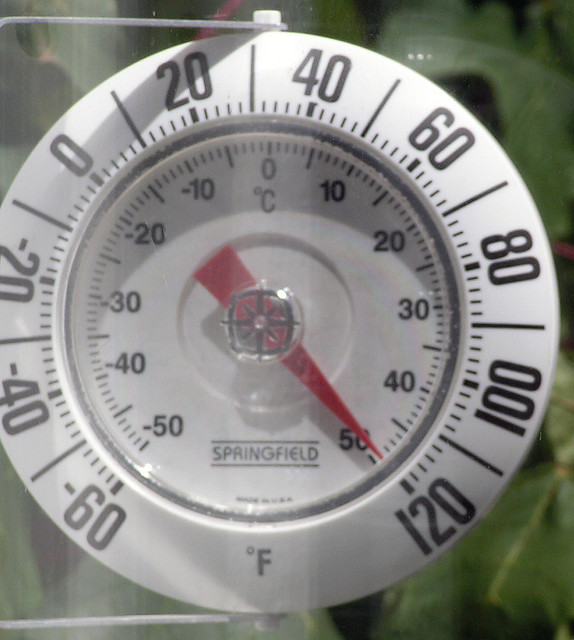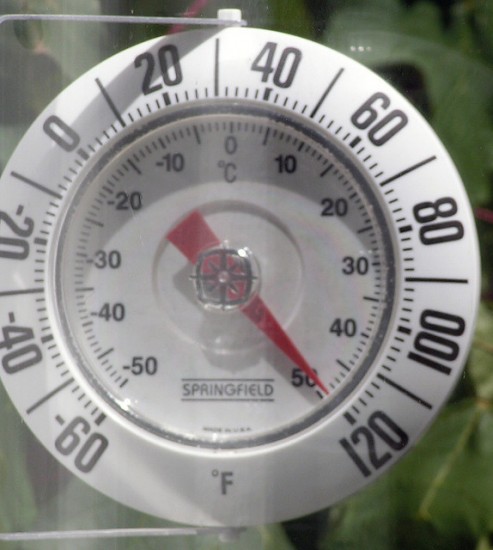In late July, officials put nearly half of the US population under heat advisories and an unusually prolonged streak of day and nighttime temperatures broke more than 220 records. At least 22 deaths were heat related. In Canada, temperatures broke records in two dozen cities across Ontario and Quebec on one day, including the hottest ever July temperature in Toronto, at 100.2F (37.9C).
A large and growing body of scientific evidence tells us that human-made climate change makes for a hotter, wetter atmosphere where droughts, floods, and heat waves going to be more frequent and more intense.
The climate science on that score is clear.
In fact, physical science is far clearer than political science, especially when it comes to measuring popular attitudes and beliefs!
For example, even in the face of overwhelming scientific consensus, the issue of man-made climate change is highly politicized in the United States. One recent poll shows that more than two-thirds of Democrats believe “the effects of global warming have already begun to happen,” versus just one-third of Republicans. This partisan divide is even more marked among elected officials. Research by Brad Johnson, ThinkProgress Wonk Room Climate Editor, shows that the 112th Congress includes huge contingent of Republicans who have explicitly rejected the threat of human-made global warming pollution:
Well over half (56 percent) of the incoming Republican caucus are climate science deniers. Thirty-five of the 47 (74 percent) Republicans in the U.S. Senate publicly question the science of global warming. Of the 242 Republicans elected to the House of Representatives, 128 (53 percent) publicly question the science.
That’s an astonishing 74 percent of the party of Lincoln in the US Senate questioning science.
As one National Journal analysis put it, “The GOP is stampeding toward an absolutist rejection of climate science that appears unmatched among major political parties around the globe, even conservative ones.”
Public attitudes are quite different north of the border, where 80 percent of Canadians believe there is solid evidence of global warming. Still, as the CBC reported a while back, “climate change is becoming the most divisive issue in this country since the fight over energy pricing in the 1970s and ’80s” and polls suggest that the ruling Conservative Party is out of sync with the Canadian public on climate. Despite clear popular support for strong action, some say that “the Canadian government continues to justify its inaction on climate change by asserting its need to be in lock-step with Washington [DC].” And Canadian Prime Minister Stephen Harper (a Conservative) has shifted back and forth between science denial and supporting climate and energy policies.
Partisanship about scientific facts is one thing. There’s also a quirky opinion research phenomenon called “visceral fit” where people are more likely to say they believe in the science of global warming if they happen to be “experiencing warm temperatures at the moment the question is asked —even if they’re indoors.”
It makes you wonder what public opinion about climate change might look like today in communities that have suffered extended streaks of 100 degree plus weather, dust storms, or flood evacuations. Hopefully pollsters are in the field taking stock of the effects extreme weather events may have had on attitudes about climate change.
Meanwhile, at least one fairly recent poll examining views on religion and natural disasters shows that a healthy majority of Americans—nearly 6 in 10—say that the severity of recent natural disasters is evidence of global climate change. (On the flip side of that, the same poll found that 44 percent of Americans believe the severity of recent natural disasters is evidence of what the Bible calls the ‘end times.’ Among Republicans, 52 percent believe that natural disasters are evidence of what the Bible calls the ‘end times’ compared to 41 percent who see it as evidence of global climate change.)
The most recent installment of the Yale Project on Climate Change Communication and George Mason University Center for Climate Change Communication’s “Six Americas” studies (in the field April 23 – May 12, before the Joplin tornado, before the current heat wave) found that roughly half of all Americans say that global warming is already causing or making the following events worse in the United States: coastline erosion and flooding (52 percent); droughts (50 percent); hurricanes (49 percent); rivers flooding (48 percent); and wildfires (45 percent).
The partisan divide basically vanishes—at least among the general public—when pollsters ask about solutions that would get families and businesses—and our whole economy—off the dirty fuel roller coaster. For example, in an interview with Tony Leiserowitz, director of the Yale Project on Climate Change Communication, Dr. Andrew Light of Center for American Progress points out that while the research shows that on the one hand, 64 percent of Americans believe global warming is happening, with only 47 percent believing humans to be the main cause, research from the same month showed that “71 percent of Americans said addressing global warming should be a very high, high, or medium priority for Congress, and a whopping 91 percent of Americans—including 85 percent of Republicans—said developing clean energy should be a very high, high, or medium priority.”
Notably, large majorities (including Democrats, Independents, and Republicans) say it is important for their own community to take steps to protect the following from global warming: public health (81 percent), the water supply (80 percent), agriculture (79 percent), wildlife (77 percent), and forests (76 percent).
Additionally, Americans indicate they want more renewable energy even if it costs more. The study shows that 68 percent of Americans support requiring electric utilities to produce at least 20 percent of their electricity from renewable energy sources, even if it costs the average household an extra $100 a year, including 82 percent of Democrats, 64 percent of Independents, and 58 percent of Republicans. And as of March, 2011, a majority of Canadians indicated that they would support policy options like a carbon tax or cap and trade even if they cost individuals up to $50 per month in energy expenses.
The Yale/George Mason research also sheds light on which messengers Americans are more likely to trust (or mistrust, as the case may be) when it comes to information about climate. In nutshell: “much of the broad information many Americans absorb about climate change is disseminated by the two sources they trust the least—the mainstream news media and their own congressional representatives.”
Who do Americans trust? Perhaps surprisingly, government agencies and scientists in general scored well. For instance, three-quarters of Americans say they have high regard for the National Oceanic and Atmospheric Administration as well as scientists overall. The Environmental Protection Agency, the Centers for Disease Control and Prevention, the National Park Service and the Department of Energy got decent marks as well.
It should be noted that most of the research I’ve cited here was conducted at the national level. Polling in the Northwest over the past few years indicates that local voters generally reflect national attitudes, even if majorities of voters in large population centers in this region are more likely to embrace the science and often show a bit more enthusiasm for solutions. Polling of Olympic Peninsula (WA) residents in late 2010 indicated similar partisan divides on “belief in climate science,” where 72 percent of Democrats said they believe climate change is happening and that it’s man-made, 48 percent of Independents said so, and only 20 percent of Republicans agree.
Back to the question of extreme weather and the public’s attitude about climate change.
For his part, Grist’s Dave Roberts doesn’t think that a single disaster (or even a few big “climate disasters”) will likely be enough to change big, entrenched systems—like our economy or our political structures—let alone people’s minds. At least not very dramatically. He’s probably right (and we’ve certainly seen that borne out when it comes to national policy efforts). After all, we have seen Hurricane Katrina and the Gulf of Mexico oil spill come and go from the public mind, creating initial waves of concern about fossil fuels and climate change that fairly quickly dissipated into mere ripples and then all but disappeared. (Here’s an interesting New York Times analysis of this phenomenon among California voters.)
But, one or two disasters (even enormous or devastating ones) here and there seems quite different to me from the relentless chain of weather events we’re seeing that are lacerating people and places—both familiar and far off—over the past months and even years. One event is too easy to shove aside as a fluke. But, it’s the bigger picture—or tableau of weird weather—that is harder and harder for people to ignore.
Still, as I’ve written before, humans may be hardwired for foot dragging—and that is unlikely to change dramatically, even in the face of more and more weather-related tragedies. Sadly, it looks like the majority of the people running the show—the ones deciding everybody’s fate even as they seal their own—are particularly prone to inaction and denial. That is, white guys.
As Dave Roberts writes this week, “there’s a study running soon in the journal Global Environmental Change called Cool dudes: The denial of climate change among conservative white males in the United States. It analyzes poll and survey data from the last 10 years and finds that … are you sitting down? … conservative white men are far more likely to deny the threat of climate change than other people.”











Barry Saxifrage
Anna, I agree that people are reacting to their own direct experience of weather more than anything else. It will take the clear emergence of extreme weather beyond the weather “noise” before most people will take it to heart enough to act on fossil fuel pollution.
The big weather disasters — the weather “Pearl Harbors” — until this year haven’t effected much of the USA population. They have been fascinating reality TV…more scary movie than actual thing to deal with. Of course they fade quickly as they never had an impact beyond infotainment.
The one thing we know for sure though is that the weather is going to get more extreme and unpredictable as the years go by. The energy in the system is much higher. It is going to be miserable for most people. The only question is how bad it needs to get before Americans decide they have had enough.
Of course the bad news is that the thermal momentum of the oceans means that once Americans decide they have had enough, then decades more of worse is already in the pipeline and headed our way.
The silver lining to me is that there will come a point when Americans, and all people of the globe, are focused together on a very important purpose: trying to re-stabilize our weather system. That could bring people together and give society a shared purpose and meaning again.
Georgie Bright Kunkel
I know that men have dominated the world of politics and management but it is sexist to use MAN-made. Human beings should not be
divided up by sex except for sperm doning and nursing a child or bearing a child. Most other activities can be engaged in by
both sexes.